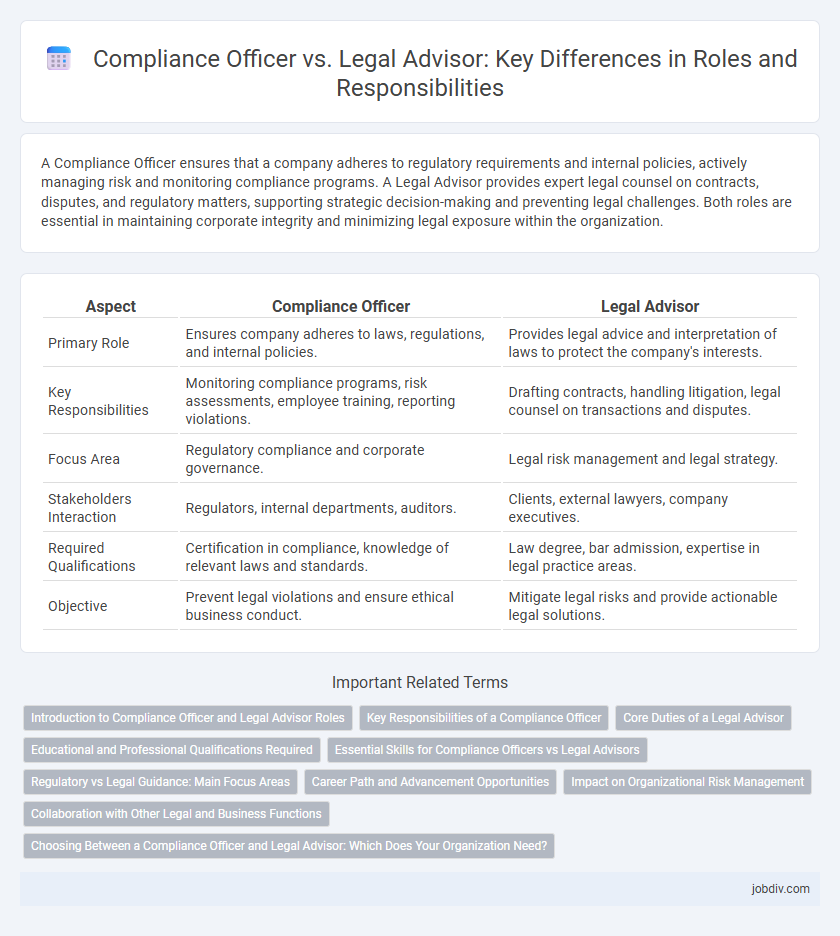A Compliance Officer ensures that a company adheres to regulatory requirements and internal policies, actively managing risk and monitoring compliance programs. A Legal Advisor provides expert legal counsel on contracts, disputes, and regulatory matters, supporting strategic decision-making and preventing legal challenges. Both roles are essential in maintaining corporate integrity and minimizing legal exposure within the organization.
Table of Comparison
| Aspect | Compliance Officer | Legal Advisor |
|---|---|---|
| Primary Role | Ensures company adheres to laws, regulations, and internal policies. | Provides legal advice and interpretation of laws to protect the company's interests. |
| Key Responsibilities | Monitoring compliance programs, risk assessments, employee training, reporting violations. | Drafting contracts, handling litigation, legal counsel on transactions and disputes. |
| Focus Area | Regulatory compliance and corporate governance. | Legal risk management and legal strategy. |
| Stakeholders Interaction | Regulators, internal departments, auditors. | Clients, external lawyers, company executives. |
| Required Qualifications | Certification in compliance, knowledge of relevant laws and standards. | Law degree, bar admission, expertise in legal practice areas. |
| Objective | Prevent legal violations and ensure ethical business conduct. | Mitigate legal risks and provide actionable legal solutions. |
Introduction to Compliance Officer and Legal Advisor Roles
Compliance Officers ensure organizational adherence to laws, regulations, and internal policies by developing compliance programs and conducting risk assessments. Legal Advisors provide expert legal guidance on contracts, corporate governance, and litigation to mitigate legal risks and support business decisions. Both roles are critical in maintaining regulatory compliance and protecting the organization from legal liabilities.
Key Responsibilities of a Compliance Officer
A Compliance Officer oversees the development and implementation of policies to ensure organizational adherence to regulatory requirements and internal standards. They conduct risk assessments, monitor compliance programs, and provide training to employees to prevent legal violations and ethical breaches. Unlike Legal Advisors who primarily interpret laws and provide legal guidance, Compliance Officers focus on enforcing regulations and maintaining ongoing compliance within the company.
Core Duties of a Legal Advisor
A Legal Advisor specializes in providing expert counsel on legal rights, responsibilities, and obligations to ensure organizational adherence to laws and regulations. Core duties include drafting and reviewing contracts, representing the company in legal proceedings, and interpreting complex legal documents to mitigate risks. This role demands deep knowledge of applicable laws to proactively advise on legal strategies and compliance frameworks.
Educational and Professional Qualifications Required
A Compliance Officer typically holds a bachelor's degree in law, business administration, or finance, often supplemented by certifications like Certified Compliance & Ethics Professional (CCEP) or Certified Regulatory Compliance Manager (CRCM). Legal Advisors are generally required to have a law degree (JD or LLB) and must be licensed to practice law, with many possessing advanced qualifications such as an LLM or specialization in corporate, labor, or regulatory law. Both roles benefit from professional experience in regulatory environments, but Legal Advisors focus more on legal analysis and advocacy, whereas Compliance Officers emphasize risk management and adherence to regulatory standards.
Essential Skills for Compliance Officers vs Legal Advisors
Compliance Officers require strong expertise in regulatory frameworks, risk management, and ethical standards to ensure organizational adherence to laws and policies. Legal Advisors must excel in legal research, contract analysis, and litigation support to provide accurate legal guidance and defend client interests. Both roles demand excellent communication and analytical skills, but Compliance Officers emphasize preventative measures while Legal Advisors focus on interpreting and applying legal principles.
Regulatory vs Legal Guidance: Main Focus Areas
A Compliance Officer primarily ensures an organization adheres to regulatory requirements by implementing policies and monitoring compliance with laws such as data protection and financial regulations. A Legal Advisor provides legal guidance on contracts, disputes, and corporate governance, focusing on interpreting laws and minimizing legal risks. The main focus areas differ as Compliance Officers concentrate on regulatory adherence, while Legal Advisors emphasize legal strategy and advice.
Career Path and Advancement Opportunities
Compliance Officers typically progress by gaining expertise in regulatory frameworks and risk management, often advancing to senior compliance roles or Chief Compliance Officer positions within industries such as finance, healthcare, and manufacturing. Legal Advisors follow a career path centered on legal research, contract negotiation, and litigation support, with advancement opportunities leading to senior legal counsel, in-house legal department heads, or eventually General Counsel roles. Both professions offer distinct pathways shaped by organizational needs, with Compliance Officers emphasizing regulatory adherence and Legal Advisors focusing on providing strategic legal guidance.
Impact on Organizational Risk Management
Compliance Officers directly mitigate organizational risk by ensuring adherence to regulatory frameworks and internal policies, reducing the likelihood of legal penalties and reputational damage. Legal Advisors provide strategic counsel on complex legal matters, helping organizations anticipate and navigate potential legal challenges before they escalate. Together, their roles synergize to enhance the robustness of organizational risk management through proactive legal guidance and enforcement of compliance standards.
Collaboration with Other Legal and Business Functions
Compliance Officers work closely with Legal Advisors to ensure organizational policies align with current laws and regulations, facilitating risk mitigation across departments. Their collaboration integrates regulatory compliance with legal strategy, fostering seamless communication between legal, finance, and operational teams. This joint effort helps in proactively identifying and addressing potential legal issues that impact business functions.
Choosing Between a Compliance Officer and Legal Advisor: Which Does Your Organization Need?
Choosing between a Compliance Officer and a Legal Advisor depends on your organization's needs for regulatory adherence versus legal risk management. A Compliance Officer specializes in implementing and monitoring internal policies to ensure alignment with industry regulations and standards. In contrast, a Legal Advisor provides expert legal counsel, contract review, and litigation support to protect the organization from legal disputes and liabilities.
Compliance Officer vs Legal Advisor Infographic

 jobdiv.com
jobdiv.com